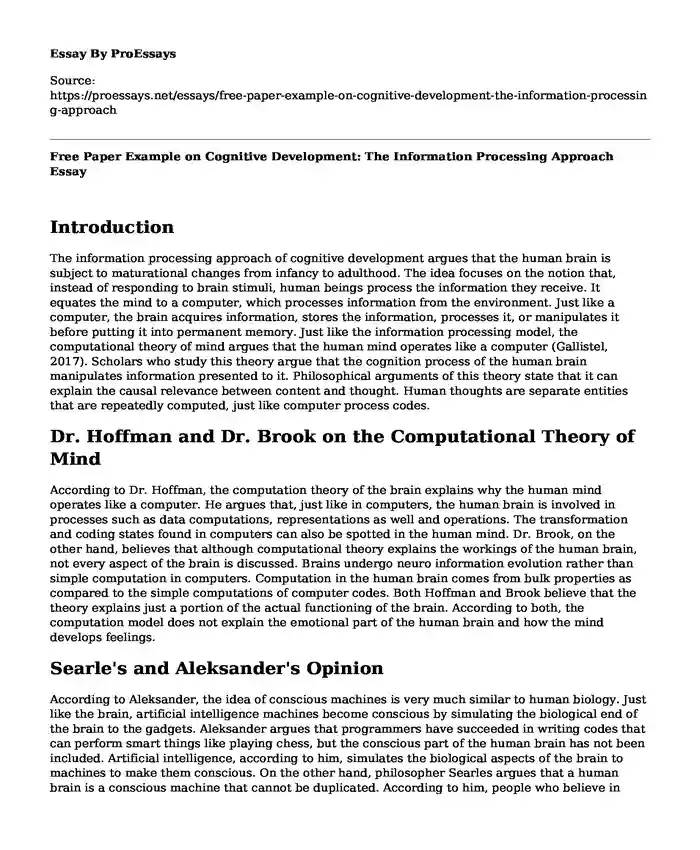Introduction
The information processing approach of cognitive development argues that the human brain is subject to maturational changes from infancy to adulthood. The idea focuses on the notion that, instead of responding to brain stimuli, human beings process the information they receive. It equates the mind to a computer, which processes information from the environment. Just like a computer, the brain acquires information, stores the information, processes it, or manipulates it before putting it into permanent memory. Just like the information processing model, the computational theory of mind argues that the human mind operates like a computer (Gallistel, 2017). Scholars who study this theory argue that the cognition process of the human brain manipulates information presented to it. Philosophical arguments of this theory state that it can explain the causal relevance between content and thought. Human thoughts are separate entities that are repeatedly computed, just like computer process codes.
Dr. Hoffman and Dr. Brook on the Computational Theory of Mind
According to Dr. Hoffman, the computation theory of the brain explains why the human mind operates like a computer. He argues that, just like in computers, the human brain is involved in processes such as data computations, representations as well and operations. The transformation and coding states found in computers can also be spotted in the human mind. Dr. Brook, on the other hand, believes that although computational theory explains the workings of the human brain, not every aspect of the brain is discussed. Brains undergo neuro information evolution rather than simple computation in computers. Computation in the human brain comes from bulk properties as compared to the simple computations of computer codes. Both Hoffman and Brook believe that the theory explains just a portion of the actual functioning of the brain. According to both, the computation model does not explain the emotional part of the human brain and how the mind develops feelings.
Searle's and Aleksander's Opinion
According to Aleksander, the idea of conscious machines is very much similar to human biology. Just like the brain, artificial intelligence machines become conscious by simulating the biological end of the brain to the gadgets. Aleksander argues that programmers have succeeded in writing codes that can perform smart things like playing chess, but the conscious part of the human brain has not been included. Artificial intelligence, according to him, simulates the biological aspects of the brain to machines to make them conscious. On the other hand, philosopher Searles argues that a human brain is a conscious machine that cannot be duplicated. According to him, people who believe in artificial intelligence and conscious machines confuse consciousness with computation. Searles states that since the real functioning of the brain is yet to be known, the idea of building machines that can operate like the human brain is illogical. Artificial Intelligence only uses numbers to program a machine, which is different from how the human brain works.
Weak and Strong AI
Narrow or weak artificial intelligence refers to machine intelligence that is expressly limited to a narrow area. It simulates the human brain's capabilities and is beneficial to people since it automates tasks by analyzing them in a manner the human brain cannot. Weak artificial intelligence can simulate the mind, but it lacks the consciousness of a human being explicitly. It also lacks general intelligence like the human mind; it can thus perform only specific tasks that are programmed (Flowers, 2019). On the other hand, strong artificial intelligence refers to a theoretical type of intelligence that has similar capabilities to the human mind. Primary features of strong artificial intelligence range from the ability to learn, communicate, solve puzzles, plan, reason as well and make logical arguments. Strong intelligence is also expected to have sapience, sentience, consciousness, self-awareness, and objective thoughts. In my personal opinion, the idea of achieving strong artificial intelligence is not real since the human mind is complex, which makes it easier to understand (Flowers, 2019). How the mind develops emotions and feelings is not yet known, which complicates the entire idea of artificial intelligence and conscious machines.
References
Brooks, R [Rodney Brooks]. (2016, Jan 27). Computational Theory of Mind. YouTube. https://www.youtube.com/watch?v=xH-lqpEDzBI#action=share
Flowers, J. C. (2019). Strong and Weak AI: Deweyan Considerations. In AAAI Spring Symposium: Towards Conscious AI Systems. http://ceur-ws.org/Vol-2287/paper34.pdf
Gallistel, C. R. (2017). The neurobiological bases for the computational theory of mind. Minds on language and thought: the status of cognitive science and its prospects. http://ruccs.rutgers.edu/images/personal-charles-r-gallistel/publications/2017_chapter_oso_9780190464783_chapter_12.pdf
Hoffman, D. [ Donald Hoffman]. (2016, Oct 3). Computational Theory of Mind. YouTube. https://www.youtube.com/watch?v=cUhrK82seVY#action=share
Cite this page
Free Paper Example on Cognitive Development: The Information Processing Approach. (2023, Nov 28). Retrieved from https://proessays.net/essays/free-paper-example-on-cognitive-development-the-information-processing-approach
If you are the original author of this essay and no longer wish to have it published on the ProEssays website, please click below to request its removal:
- Genetics and Meditation
- Understanding Subjects With Paranoid Schizophrenia Research
- Building Your Career Success: Discover Your Power
- Research Paper on Childhood Adversity and Schizophrenia
- Research Paper on Pathophysiology of Schizophrenia
- Listen, Smile & Create Joy: Comforting Someone During Grieving Paper
- Russia: A Dominant Player in Global Energy Trade - Free Report Sample







